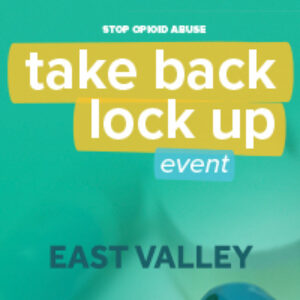
Confronting the Opioid Crisis Together, Upcoming Events Offer Opportunity for Individuals to Take Back, Lock Up Medications
For more information, contact Kim Papich (509) 324-1539 or kpapich@srhd.org
Spokane, WASH – Oct. 17, 2018 – As the newly formed Spokane Regional Opioid Task Force embarks on several strategies to “confront the opioid crisis together,” members are reminding residents to lock up medications, as well as safely dispose of any unused meds.
To make the process free and easy, the task force is collaborating with NorthEast Washington ESD 101 (NEWESD 101) and its multiple partners to provide two Take Back Lock Up events. The West Central and East Valley events are being coordinated through NEWESD 101’s West Spokane Wellness Partnership (formerly West Central Community Coalition) and East Valley Community Coalition and will take place:
- West Central Take Back Lock Up Event Saturday, October 20, 2018, 10:00 a.m. - 3:00 p.m. West Central Community Center 1603 N. Belt St., Spokane, WA
- East Valley Take Back Lock Up Event Saturday, October 27, 2018, 9:00 a.m. - 2:00 p.m. CHAS Health Valley Clinic 15812 E. Indiana Ave., Spokane Valley, WA
Task force and coalition members encourage individuals to drop in to safely dispose of unwanted prescription drugs, pick up a lockbox and learn more about opioid addiction.
Substance misuse is a complex topic that includes diversion of opioids when they become illegal through means, such as being stolen, or when sold to another individual. Safe storage and disposal can help prevent diversion, as well as associated adverse health outcomes. Beyond the individual, there are costs to society, first responders and families.
“Prescription drug misuse, including opioid abuse and overdoses, has created a public health crisis we need individuals and organizations alike to come together to address,” said Dr. Bob Lutz, Spokane Regional Health District health officer and task force organizer. “Locking up meds, as well as properly disposing of old and unneeded medication, are key factors in addressing this crisis and making our community safer.”
Excessive use of opioids can lead to an acute overdose resulting in a decreased level of consciousness and a slowing of the heart rate and respiration. An overdose can result in the need for emergency care, hospitalization or death.
Rates of prescription drug abuse in the Spokane County are concerning, as are the number of accidental poisonings and overdoses due to these drugs. In Spokane County, from 2013-2017, there were 197 opioid-related deaths. According to the most recent data, approximately 6,300 Spokane County adults, and one in 20 high school students, used an opioid medication to get high in the past 30 days.
Said Annie Murphey, Community Coalition Coordinator for NEWESD101, “These events address a vital public safety and public health issue. Many people in Spokane are not aware that medicines that languish in home cabinets are highly susceptible to diversion, misuse, and abuse. We recognize prevention is a community issue and if we can educate people about what is in their own homes, we can not only positively impact our own individual families, but also youth and young adults across the community.”
Studies show many abused prescription drugs are obtained from family and friends, including from the home medicine cabinet. In addition, many people do not know how to properly dispose of unused medicine, often flushing them down the toilet or throwing them away - both potential safety and health hazards.
In addition to stemming diversion of illegal opioids in Spokane County, the task force is also working to increase community awareness around misuse and addiction, educate providers about appropriate prescribing practices and non-opioid options for pain management, and address the stigma associated with substance usage.
Concluded Dr. Lutz, “Opioid use disorder is now recognized as a chronic brain disease rather than a moral failing. It’s essential we treat affected individuals and families with empathy rather than criticism.”
###
Spokane County Opioid Task Force The purpose of the Spokane County Opioid Task Force is to reduce and prevent opioid dependency and deaths across Spokane County. The task force engages multiple public and private entities and utilizes evidence-based best practices and evaluation. Members are currently developing strategies to:
- Improve the public’s awareness of the dangers associated with opioids and other substances, while reducing stigma and increasing educational resources.
- Reset the standard of practice of non-opioid pain management modalities among medical providers and consumers. Develop integrative practitioner network available to assist with acute and chronic pain management.
- Educate providers on screening and appropriate treatment for mental illness, addiction, and pain, and appropriate use of medication.
- Create community-based policies and systems that respond to addiction and its collateral consequences.
The task force is facilitated by Spokane Regional Health District. More information is available at srhd.org.

